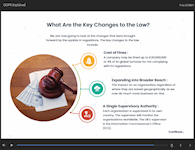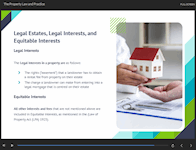Introduction to English Common Law
Advanced Diploma | CPD Certified | Free PDF Certificate | Lifetime Access | Free Retake Exam
Training Express Ltd
Summary
- Certificate of completion - Free
- Certificate of completion - Free
- Exam(s) / assessment(s) is included in price
- Tutor is available to students
Add to basket or enquire
Overview
The UK Law Complete Course (Employment, GDPR, Property & Taxation) is a comprehensive training package for anyone taking their first steps towards a career in the field of law. It covers fundamental topics such as employment contracts, the Capital Goods Scheme, the employee handbook, employee wages, and changes in the property market.
You will gain theoretical knowledge that can be applied in a real-world context, equipping you with a range of skills to work in employment law, compliance, the property sector or taxation. What’s more, you’ll be learning from the experts, covering the fundamentals, best practice procedures, legal responsibilities, and key legislation.
By the end of the course, learners will have the skills, confidence and certification to work in a range of professions in the field of law and compliance, including data protection, contract management and tax accounting, with an excellent understanding of their legal responsibilities.
- Instant e-certificate and hard copy dispatch by next working day
- Fully online, interactive course with audio voiceover
- Self-paced learning and laptop, tablet, smartphone-friendly
- 24/7 Learning Assistance
- Discounts on bulk purchases
Learning Outcomes
By the end of the course, learners will be able to:
- Demonstrate a detailed understanding of the legal rights of employers and employees
- Identify each stage of the legal recruitment process
- Understand the different types of employment contracts and the key elements
- Take disciplinary action with an employer if an employee is not complying with company policies
- List the differences between National Minimum Wage and Living Wage
- Recognise discrimination in the workplace and take necessary measures to put a stop to it
- Understand the basics of GDRP and its relevancy after BREXIT
- Comply with data protection laws and protect individual’s rights when managing their data
- Discuss land law principles, mortgages, co-ownership, and legal estates in detail
- Show an understanding of Value added Tax and the Capital Goods Scheme
CPD
Course media
Description
Course Curriculum
Module 01: Basic of Employment Law
In module one, we will explore the fundamentals of employment law in the UK and how they are designed to protect both employees and employers’ rights. This introductory module also provides an insight into the industry and the role of an employment lawyer.
Module 02: Legal Recruitment Process
In module two, we will take an in-depth look at the legal recruitment process in the UK and its fundamental stages, learning through case studies and audio-visual material.
Module 03: Employment Contracts
In module three, we will learn about the different types of employment contracts in the UK, how a contract is established, and what is covered in a contract.
Module 04: Employee Handbook
In module four, we will deepen our understanding of the employee handbook and what should be included in it. It covers key topics such as UK work policies, company guidelines and wages.
Module 05: Disciplinary Procedure
In module five, we will gain a comprehensive understanding of disciplinary procedures for employees, the steps in the disciplinary process, and the different types of disciplinary actions that can be taken by an employer.
Module 06: National Minimum Wage & National Living Wage
In module six, we will explore the national minimum wage and the national living wage in the UK, taking a look at their differences, the law and wage entitlement.
Module 07: Parental Right, Sick Pay & Pension Scheme
In module seven, we will learn all about parental right, employee statutory sick pay and pension schemes, covering topics such as maternity leave, the different types of pensions, and sick leave.
Module 08: Discrimination in the Workplace
In module eight, we will explore the kind of behaviour that constitutes discrimination in the workplace, with examples. It covers the different types of discrimination and the laws that protect against discrimination in the workplace.
Module 09: Health & Safety at Work
In module nine, we will take a look at health & safety regulations in the workplace and the legislation surrounding workplace accidents and injuries. We will also learn about the legal responsibilities of employers and employees regarding this topic.
Module 10: Dismissal, Grievances and Employment Tribunals
In module ten, we will broaden our knowledge of employee dismissals, grievances and the employment tribunal process. It covers grounds for dismissal, grievance procedures and the process for making a claim to an employment tribunal.
Module 11: Workplace Monitoring & Data Protection
In this final module, we will explore workplace monitoring policy in detail, and the key principles of the General Data Protection Regulation (GDPR).
Module 12: GDPR Basics
Module 11 is intended to give you a general overview and will be centred around the fundamental aspects of GDPR. Here we will go over what it means, the authorities involved, and its relevancy after BREXIT.
Module 13: GDPR Explained
In module twelve, we’ll take a closer look into the GDPR. This includes a more detailed and thorough analysis of how data laws have evolved as a result of the growth of the use of personal data itself. We will cover concepts such as the legal implications and the correct implementation of GDPR into organisations.
Module 14: Lawful Basis for Preparation
Module thirteen will focus further on the legal aspects of GDPR, the idea of lawful basis and their significance relative to both individuals and organisations. We will also go through specific topics such as which law applies to which form of data and how this data should be handled as a result.
Module 15: Rights and Breaches
The individuals themselves will be the focal point of Module fourteen, and here we will go over their rights when organisations collect their data. We will also look at how organisations themselves must ensure that all data protection laws comply appropriately, and the procedures that they must undertake.
Module 16: Responsibilities and Obligations
In module fifteen, we will explore the key responsibilities organisations have when complying with the GDPR. We will outline the full course of action legally required of a company to protect an individual’s data, and how penalties of appropriate margins can be enforced on organisations for failure to comply.
Module 17: The Property Law and Practice
In module sixteen, we will get a brief overview of land law principles, mortgages, co-ownership, legal estates, and other key topics that will be discussed in detail in this course.
Module 18: Ownership and Possession of the Property
In module seventeen, we will explore the nature of ownership and land possession, covering the roles played by ownership and the limitations of ownership. It also discusses the possession of goods and the protection of possession.
Module 19: Co-Ownership in Property
In module eighteen, we will deepen our understanding of joint tenancies and the use of co-owned properties, exploring basic concepts and other forms of co-ownership.
Module 20: Property Taxation on Capital Gains
In module nineteen, we will learn about property business trading and investment, property expenditure, revenue and capital, capital gains tax on disposals, stamp duty land tax charge and anti-avoidance basics.
Module 21: VAT on Property Taxation
In module twenty-two, we will broaden our knowledge of Value Added Tax and the VAT Capital Goods Scheme. It covers key topics such as VAT on acquisition, and VAT and transfer of a going concern.
Module 22: Property Taxation Tips for Accountants and Lawyers
In module twenty-one, we will explore the differences between real property and personal property, with guidance on how to discuss tax returns with clients and avoid the traps that can restrict principal private residence.
Module 23: Changes in the UK Property Market
In module twenty-two, we will explore some key changes in the property sector, taking an in-depth look at generation rent and millennials, as well as the emergence of build to rent and co-living.
Who is this course for?
This complete course is suitable for anyone looking to kickstart a career in this field, which includes the following professions:
- Employment/Tax Lawyer
- GDPR/Compliance Officer
- Legal Secretary
- Compliance Specialist
Requirements
Learners do not require any prior qualifications to enrol on this course.
Career path
- Solicitor - £30-60k/year.
- Barrister - £40-100k/year (highly variable depending on experience and location).
- Paralegal - £20-40k/year.
- Legal Executive - £25-60k/year.
- Legal Researcher - £25-50k/year.
- Compliance Officer - £30-60k/year.
Questions and answers
Currently there are no Q&As for this course. Be the first to ask a question.
Certificates
Certificate of completion
Digital certificate - Included
Certificate of completion
Hard copy certificate - Included
You will get the hard copy certificates for Free! The delivery charge of the hard copy certificate inside the UK is £3.99 each.
Reviews
Currently there are no reviews for this course. Be the first to leave a review.
Legal information
This course is advertised on reed.co.uk by the Course Provider, whose terms and conditions apply. Purchases are made directly from the Course Provider, and as such, content and materials are supplied by the Course Provider directly. Reed is acting as agent and not reseller in relation to this course. Reed's only responsibility is to facilitate your payment for the course. It is your responsibility to review and agree to the Course Provider's terms and conditions and satisfy yourself as to the suitability of the course you intend to purchase. Reed will not have any responsibility for the content of the course and/or associated materials.




